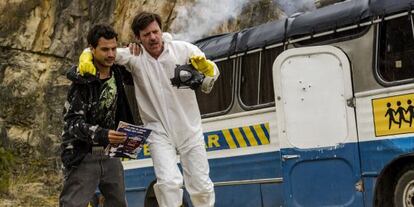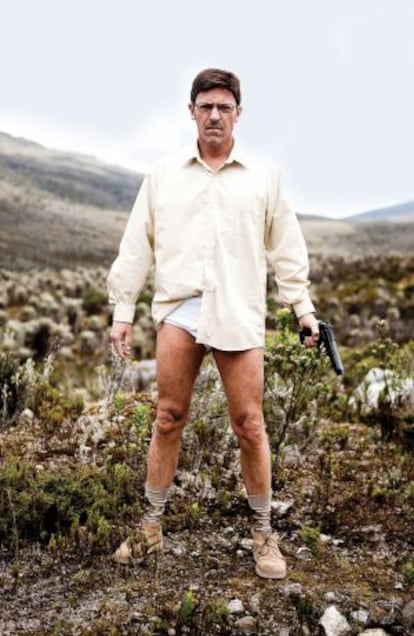Why Walter White now goes by the name of Walter Blanco
A “latinized” version of critically acclaimed show ‘Breaking Bad’ has begun its 62-episode run

The Walter White character that viewers saw descend into the depths of hell in Breaking Bad is now called Walter Blanco. He speaks Spanish and has swapped the arid landscape of Albuquerque for the mountains that surround the urban hustle and bustle of Bogota. The rest, however, remains the same in Metástasis, the “latinized” version of an AMC production that has already become a televisual classic.
Metástasis, which began last week on Univisión, Unimás and Galavisión, stays faithful to the characters, plot and dialogue created by showrunner Vince Gilligan for Breaking Bad. Once again we see an anodyne nobody, Walter, a chemistry teacher who we later learn has been given the bad news that he is suffering from lung cancer. In the opening scenes he is driving a beat-up school bus in just a pair of underpants. In the back of the vehicle is a methamphetamine lab. Outside, a police chase is taking place. It’s a déjà vu of what millions of people watched six years ago, but this time it’s in Spanish.
The trailer for ‘Metástasis,’ the Spanish-language remake of ‘Breaking Bad.’
Andrés Baiz, one of the directors of Metástasis, uses the term “latinization” to explain why this new old series has been made. As he explains, the story of Breaking Bad is too “risky and original” to not try to bring it to the Latin American public, which is why he wanted to put it in the right context. The rest, they say from Sony Pictures Television, is “very, very similar.” Walter White is now Walter Blanco; Jesse Pinkman is José Miguel Rosas, and Skyler, Cielo. And the drug they are making is still methamphetamine – even in a country more famous for cocaine.
There are elements from Breaking Bad that have been lost in translation. For example, Blanco is now a teacher in a private, rather than a public school, as White was, given that the job would be so badly paid in Colombia that it wouldn’t give Walter any kind of standard of living in Bogota. There is no swimming pool in his house, because this part of Colombia is somewhat colder than Albuquerque. And instead of the famous RV used by White and Pinkman to cook up their first batches of the best methamphetamine on the market, Blanco and Rosa use a school bus. All these changes were endorsed by Gilligan, who worked on the project with the producers.

What has not changed is the tone of the show, which, far from being just another production about drug trafficking, is all about moral dilemmas. As the producers point out, both Breaking Bad and Metástasis are dramas where the world of drugs is a backdrop. “It’s a story that could take place anywhere in the world,” explains producer Andrea Marulanda. “But particularly in Latin America.”
The attention to detail includes the far-from-attractive underwear worn by White/Blanco, to the hat sported by his alter-ego, Heisenberg (spelt with a J in Spanish). Even some of the distinctive camera angles used in the original are the same.
The biggest change, however, is all about viewing habits. Instead of being spread across six seasons and six years, as the original was, Metástasis will see its 62 episodes broadcast over three months. It’s a style more suited to viewers of soap operas, a genre that some of the shots in Metástasis bring to mind, given its tone and limited budget.
On the basis of these similarities and differences, the question remains: why do a Spanish version of the best-written show of recent years? The producers are not lacking reasons, such as the similarities between Albuquerque and border towns in Latin America, or the ease of using a well-known concept as their starting point. What’s more, for viewers there’s also a kind of morbid curiosity: what will they have done with my favorite show?
So far, the formula appears to have worked. The first episode was watched by 3.4 million viewers in the US, making the broadcast of Metástasis the most-seen show on a general channel in Los Angeles.
Tu suscripción se está usando en otro dispositivo
¿Quieres añadir otro usuario a tu suscripción?
Si continúas leyendo en este dispositivo, no se podrá leer en el otro.
FlechaTu suscripción se está usando en otro dispositivo y solo puedes acceder a EL PAÍS desde un dispositivo a la vez.
Si quieres compartir tu cuenta, cambia tu suscripción a la modalidad Premium, así podrás añadir otro usuario. Cada uno accederá con su propia cuenta de email, lo que os permitirá personalizar vuestra experiencia en EL PAÍS.
¿Tienes una suscripción de empresa? Accede aquí para contratar más cuentas.
En el caso de no saber quién está usando tu cuenta, te recomendamos cambiar tu contraseña aquí.
Si decides continuar compartiendo tu cuenta, este mensaje se mostrará en tu dispositivo y en el de la otra persona que está usando tu cuenta de forma indefinida, afectando a tu experiencia de lectura. Puedes consultar aquí los términos y condiciones de la suscripción digital.








































